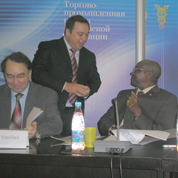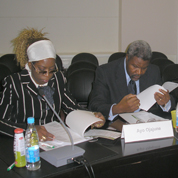Nigerians use their Diaspora Day to highlight their nation’s business opportunities

“The Diaspora Day is an annual event that was initiated in 2006 by the Nigerian Government to tap the potentials of all the Nigerian professionals abroad and integrate them into the nation’s development process.”
Opening the floor as the ‘nominal’ host, as the event was held on the RCCI premises in downtown Moscow, Vasiliev noted that Russia sees Nigerian expatriates as one of key points of contacts for its Africa relations. “We see them as a vital bridge between Russia and the entire continent, as special envoys of African businesses, cultures, sciences, high technologies and cuisine,” he added. Vasiliev specifically stressed the urgent need to expand the current level of business relations between Russia and Nigeria — not only in the traditional spheres of trade and investment figures, where there are conflicting statistics, but also in other  vital sectors, where both nations’ economies have the capabilities to harmoniously augment each other on the international markets.
vital sectors, where both nations’ economies have the capabilities to harmoniously augment each other on the international markets.
Speaking on the conflicting statistical data on bilateral trade, Vasiliev noted that the Nigerian side has estimated the annual bilateral trade turnover at about $1bln, while the Russian side’s figure is more conservative, at about $300mln per year. “But the main problem is not in these conflicting figures, but the need to broaden the scope of the existing cooperation to include other vital sectors of our economies,” he added. “In this context, the overall coordination of these efforts belongs to the two nations’ governments, and their embassies, whose roles in expanding business relations cannot be overemphasized.”
From his side, Bakov stressed the importance of individual contacts among business partners in boosting mutually beneficial cooperation. Thus, citing personal experience, he noted that though his company had always contemplated on investing in Nigeria, it was only after the visit of the Nigerian ambassador to his factory two years ago that the strategic decision to invest in the African nation was taken. “This is why I believe that NIDOE-Russia and the NRBC will greatly help to further develop the mutual cooperation in both private and public sectors of the two nations’ economies.”
Igor Kudrin, the president of Inecotech, who had previously visited Nigeria on the country’s government invitation, called for parts of the NIDO Investment Fund to be used to bankroll the preliminary studies and proper documentations of potential investment projects for foreign investors. “This is because some of the investment projects in the mining sector presented to us during our business trip to Nigeria had no business plans, geological and cost feasibility studies reports,” he said. “This is why it will make more sense to use parts of this fund to finance these studies on such projects. Alternatively, such studies could also be bankrolled by either the state and/or federal governments. If this is done and these projects eventually come onstream, all parties, including NIDO, will gain from the profits.”
NIDO to enlighten Russian investors on Nigeria’s business procedures
The Nigerian ambassador praised the maiden Diaspora Day organizers for their efforts, as the event has opened a new braining-storming arena and a unique platform to showcase Nigeria’s enormous investment opportunities to Russian investors contemplating on expanding their businesses to the Africa’s most populous nation.
Equally important, according to the ambassador, is the conference’s call on all Nigerians in Russia with the required skills, business acumen, entrepreneurial experiences and resources to motivate their Russian business partners into making strategic investments in the Nigerian economy. “This is why the role of NIDOE-Russia is very significant. It is very important for investors to know that lots of business opportunities exist in Nigeria, but the main problem has always been that some foreign investors do not know the appropriate procedures on doing businesses in Nigeria,” he said. “In this regard, I see one of the NIDOE-Russia’s objectives in encouraging its Russian business partners to incorporate companies in Nigeria and later help integrate them into the local business community. This is a direct responsibility of every NIDO-Russia member.”
Stressing the fact that the currently robust bilateral relations at the highest political levels between the two nations’ leaderships are now favorable to joint business ventures, the ambassador noted that since President Dmitry Medvedev’s historical visit to Nigeria in July 2009, several top Nigerian government officials, notably, the Kogi State Gov. Idris Ibrahim, have visited Russia to woo local investors, seek new equipment and mutual trade opportunities.
“The Nigerian Embassy is here to help all Russian investors seeking business opportunities in Nigeria. This is why I need to note once more that the embassy is the only official source of information on business activities and procedures in Nigeria.”
The ambassador also reiterated the Nigerian Embassy’s readiness to help all conscientious Russian investors get the vital information needed to incorporate businesses in Nigeria and also help fast-track the processing of their traveling documents to facilitate their visits to the country. “The Nigerian Embassy is here to help all Russian investors seeking business opportunities in Nigeria. This is why I need to note once more that the embassy is the only official source of authentic information on business activities and their procedures in Nigeria,” he added. “This is why I would like to use this forum to advise all future foreign investors to desist from the rampant practice of using the Internet as a default source of authentic information on business procedures in our country.”
Now is the time for actions
Speaking on behalf of the Russian academia, Pyotr Kupriyanov, a senior research fellow at the Institute for African Studies at the Russian Academy of Sciences, focused the audience’s attention on the long established importance of Nigeria on the African continent and its over 50 years of mutually beneficial relations, first  with the Soviet Union, and currently with contemporary Russia. “Suffice it to say that there was a time, when a whole department of our institute was dedicated to Nigeria alone,” he noted. “Besides, roundtable discussions extending over 30 years have been held on this African nation, while last year, we marked the 30th anniversary of our relationship with it, in fact, the only country in Africa that we have maintained such cordial ties with.”
with the Soviet Union, and currently with contemporary Russia. “Suffice it to say that there was a time, when a whole department of our institute was dedicated to Nigeria alone,” he noted. “Besides, roundtable discussions extending over 30 years have been held on this African nation, while last year, we marked the 30th anniversary of our relationship with it, in fact, the only country in Africa that we have maintained such cordial ties with.”
Kupriyanov called on businesses in both countries to convert the numerous theoretical studies and researches on Nigeria into practical use. “Now is the time to seek how to convert this enormous knowledge on Nigeria into a special business guide for Russian strategic investors eyeing the African nation as a vital destination for their overseas-bound investments. Indeed, contemporary Russian strategic investors intending to do businesses in Nigeria need to be more active and dynamic in their endeavors, like it was in the 1970s,” he added. “In this aspect, the Institute for African Studies in particular, and the Russian Academy of Sciences as a whole, are ready to cooperate within their capabilities and resources with the NIDOE-Russia to significantly boost the level of cooperation between Russia and Nigeria.”












 Web design,
Web design,